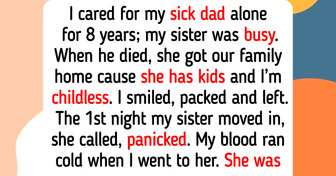Interesting article , didnt know those facts !
Why We Still Need These 11 Body Parts That We Don’t Really Need for Survival
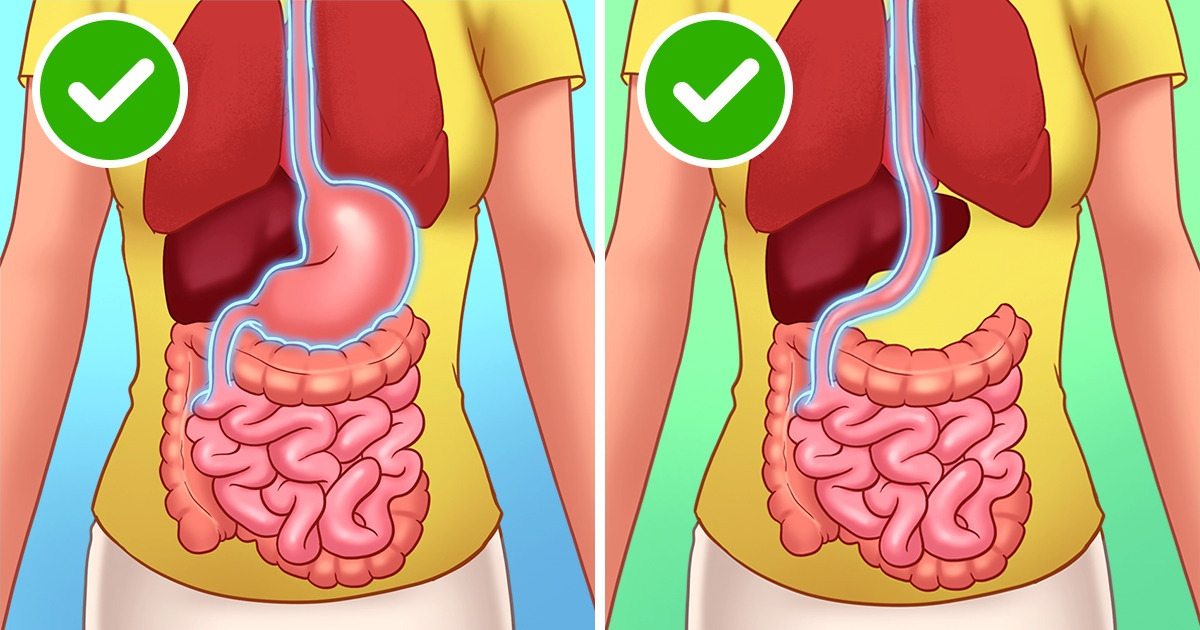
The human body is extremely capable of adapting to changes — we can lose many organs and still function properly, unless it’s done all at once, then that wouldn’t be healthy. However, if you do lose a majority of your body parts that play important roles, there is always a solution, like adding vitamin supplements to your diet. Either way, it won’t have much impact on your life and you can still lead a fulfilling life.
Bright Side offers a list of body parts that we don’t necessarily need in our lives to survive.
1. Nostril
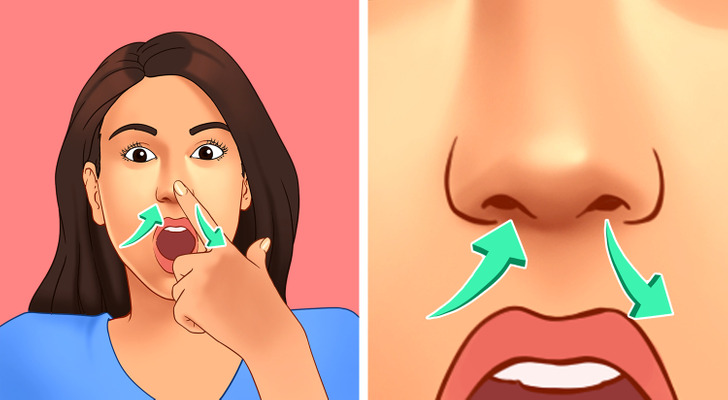
Our nose has 2 holes, or nostrils, which are separated by a septum (this is what separates the right and left nostrils). They go through something called the nasal cycle and this basically gives us 2 noses. This cycle states that one of your nostrils works harder than the other.
Every few hours, we switch from breathing through one nostril to the other due to our tissues swelling inside. It’s important for one nostril to pass through less airflow than the other because it gives us super smelling abilities. We really are super-humans!
2. Lung
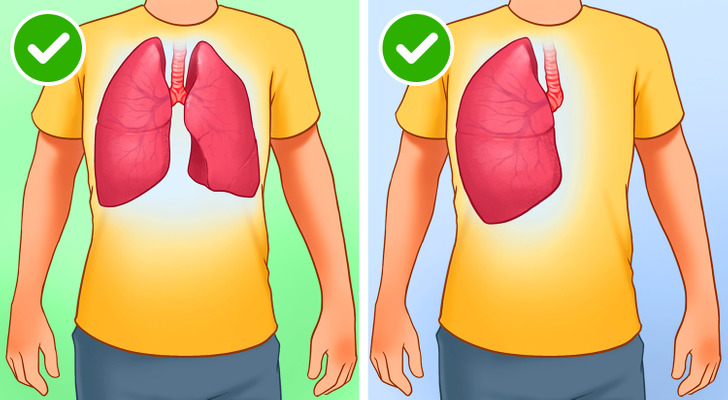
The lungs, as we know, serve to deliver oxygen to the body. But what’s surprising is that we can function and can survive with only one lung, with a few setbacks. Athletes, for example, wouldn’t be able to exercise to their full potential, but they would still be able to exercise.
The body would get used to functioning without one lung by making up for the loss of oxygen. Also, the lung that isn’t removed will get bigger by adapting itself to those changes. All it takes is time and practice to fully get used to it.
3. Stomach
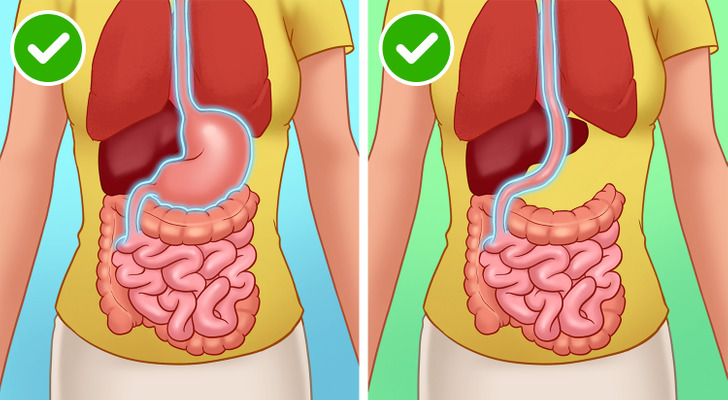
You heard it right, most people can live without a stomach. While the small intestines are vital for survival and the most important part for digestion, the stomach isn’t. Our body is able to skip the breaking down of food and pass it down to the intestines.
As a surgical procedure, surgeons can connect the esophagus (the tube that connects the throat to the stomach) to the small intestines, and as a result, people may eat normally with the addition of taking vitamin supplements. However, the stomach is usually removed only if a person has a serious disease like stomach cancer.
4. Tonsils
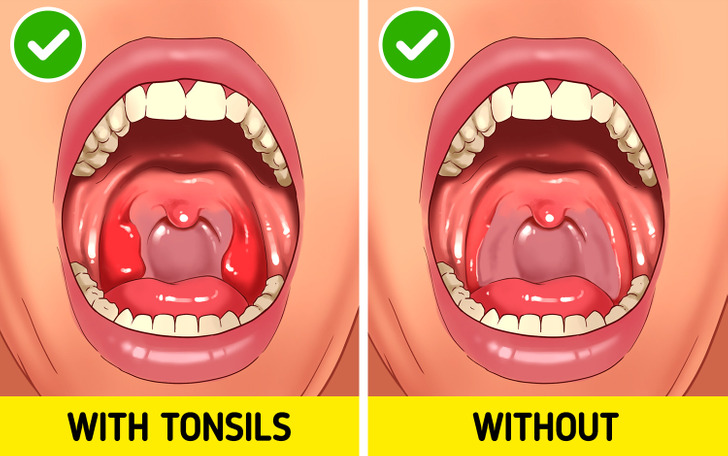
For the most part, removing tonsils is done at an early age for kids. But adults can have them removed too, and it is possible to live without them. Tonsils are located at the back of your throat, and their job is to keep germs from coming into the mouth.
For most people, they usually get smaller as we get older but sometimes they don’t — and this is when they become infected and need to be removed through a process called a tonsillectomy.
5. Goose-bump muscles
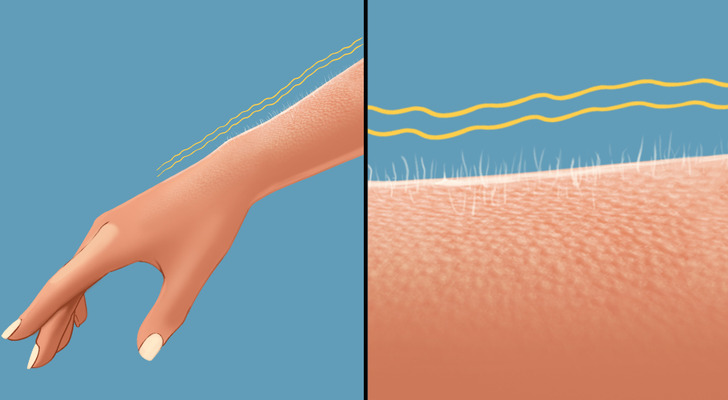
Ah, yes, we all know that goosebumps activate when we listen to a soulful song, when it’s very cold outside, or when we’re scared. But we don’t really need them, unless we’re built like our hairy ancestors who required them for extra protection from the cold.
Muscle fibers known as arrectores pilorum are the ones that make goosebumps, and our past selves were kind of committed to using them as today’s puffy jackets against the cold.
6. Some ear parts
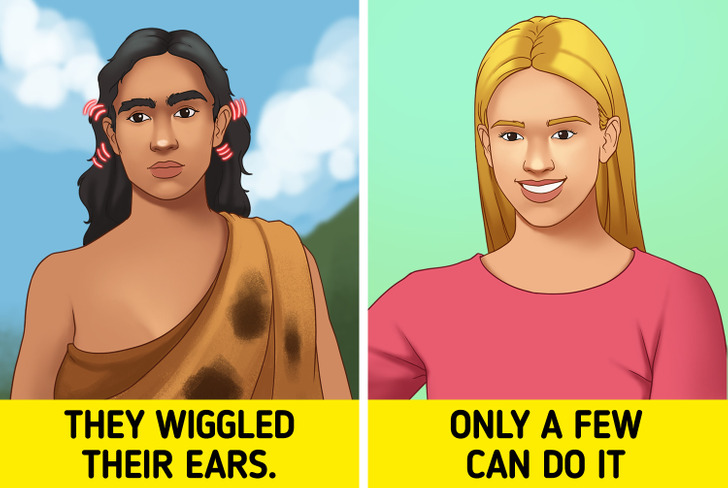
Of course, we need ears to hear but, we don’t need to move them to do this. There is a group of muscles called auriculares that our ancestors used to move their ears for better hearing and expressing emotions as animals do.
Although we still have them today and are able to slightly wiggle them, they are weaker due to evolutionary reasons. However, our ears move when we feel emotions such as happiness, and this is a phenomenon that can’t be explained.
7. Large intestine
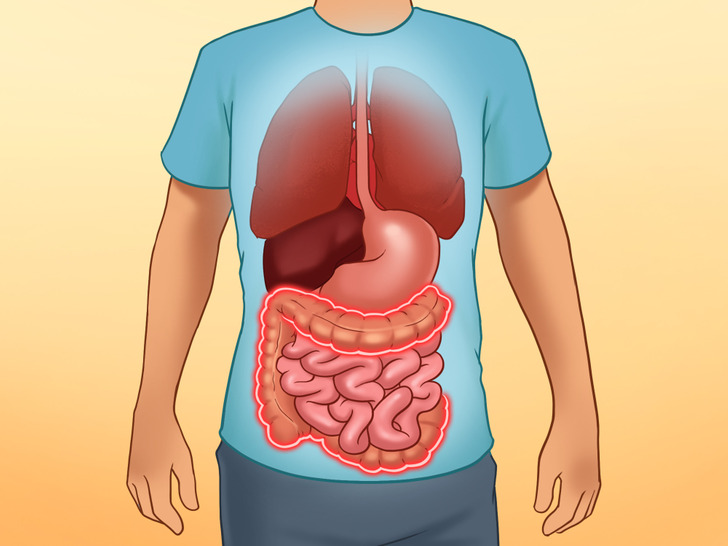
The large intestine’s main role is to remove waste from the body. It doesn’t really contribute to metabolism and has a straighter pathway to the belly, that’s why people can survive without it. There is no reason to have it removed, unless it’s due to a serious disease. But do not be frightened, you can live a fulfilling life without it.
8. A third eyelid
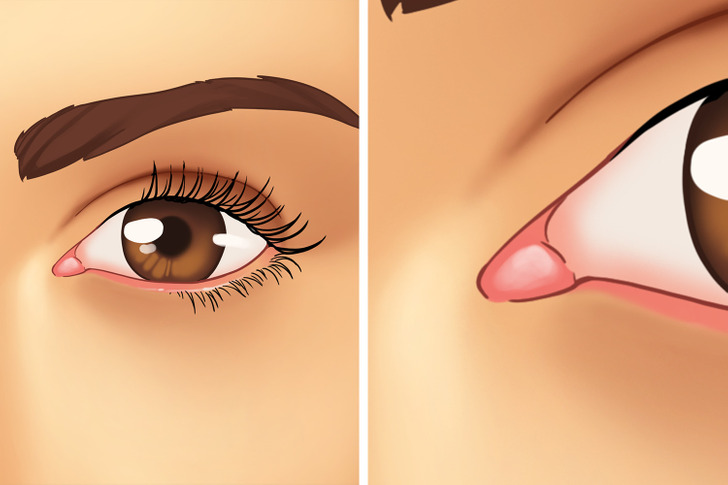
If you stare into your eyes in the mirror, you’ll see a small pink circle settled in the corner of your eye. This is your third eyelid, useless for us but useful for animals, like birds, to keep dust and scattered debris from getting into their eyes.
If you’ve heard of natural selection, this might sound familiar to you. To put it short, natural selection keeps body parts throughout generations, but some of them are harmful so they are phased out in the next generation, and others that aren’t staying, just like the third eyelid.
9. Tailbone
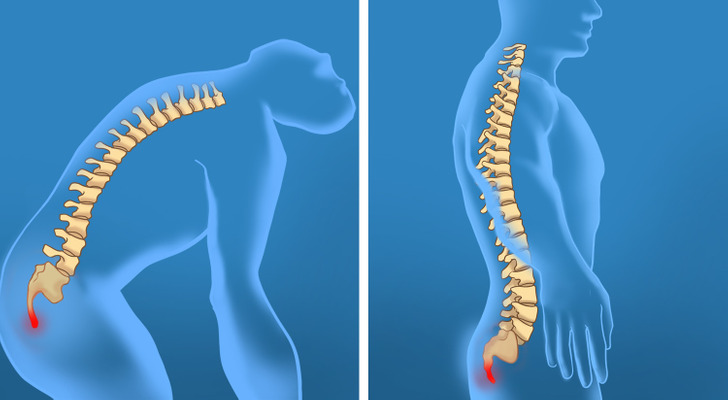
We do, indeed, have a tailbone and it is quite useless for us, unlike the mammals who needed it for balance and communication. It was even useless for our ancestors when they started learning to walk on 2 feet.
Evolution transformed this into bones located at the base of our spine. Some findings suggest that this bone is still used for supporting some muscles and the pelvic area, but it’s been proven that it has minor to no use after all.
10. Spleen
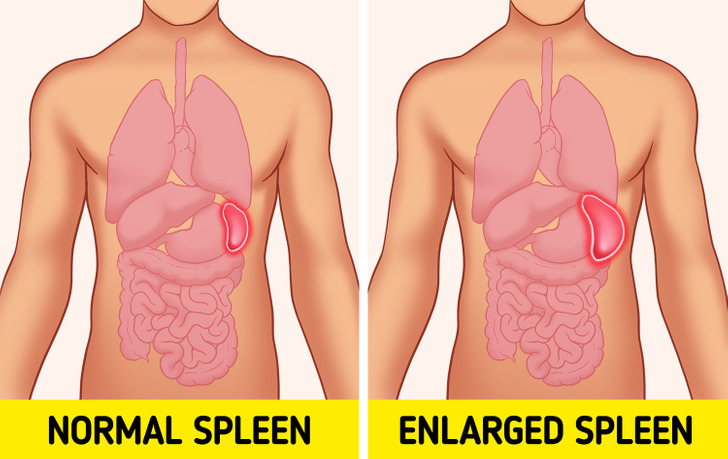
The spleen is located on the left side of the abdomen, next to your stomach. It is an important organ, but people can live without it. When the spleen stops functioning properly, like becoming enlarged or damaged, it creates a problem. This would be a sign to remove it.
After its removal, the results may make you prone to developing infections faster. However, the liver, for example, will take over its tasks and you’ll still be able to manage these infections.
11. Gallbladder
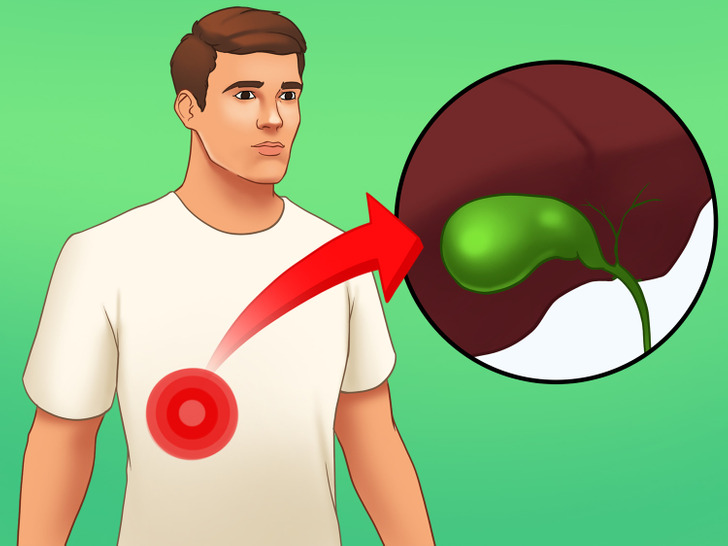
The gallbladder is placed on the right side of the abdomen beneath the liver. Without it, the body wouldn’t be able to gather the digestive juices called bile, but as a replacement, the liver would perform this task and release it to the small intestine.
You would still be able to digest a lot of foods, however, eating too many greasy or fatty foods may become an issue as it would result in bloating and gas.
Which body parts that we don’t really need were you surprised about? Have you had any removed?
Comments
Related Reads
My Husband Promised to Stop Watching Me Through the Cameras—He Lied

12 Moments Where Empathy Showed the Power of a Kind Heart

I Refuse to Sacrifice My Life Because My Family Chose Me as Grandma’s Caretaker

15 Quiet Moments of Kindness That Made the Biggest Impact

I Refuse to Let My Sister Hijack My Pregnancy Announcement

My Brother Has No Kids but Refuses to Share His Inheritance With Mine—I’m Furious

I Refused to Be the Office’s “Go-To” Holiday Backup Just Because I’m Single

I Refuse to Earn Less Just Because I’m Getting Older

I Refuse to Risk My Son’s Safety to Save My Ex’s Child

I Refuse to Give Up My Weekends for Unpaid Work Events—Now HR Stepped In

13 Beautiful Stories That Prove a Mother’s Love Heals All Wounds

12 Moments That Show Quiet Kindness Brings the World Together
